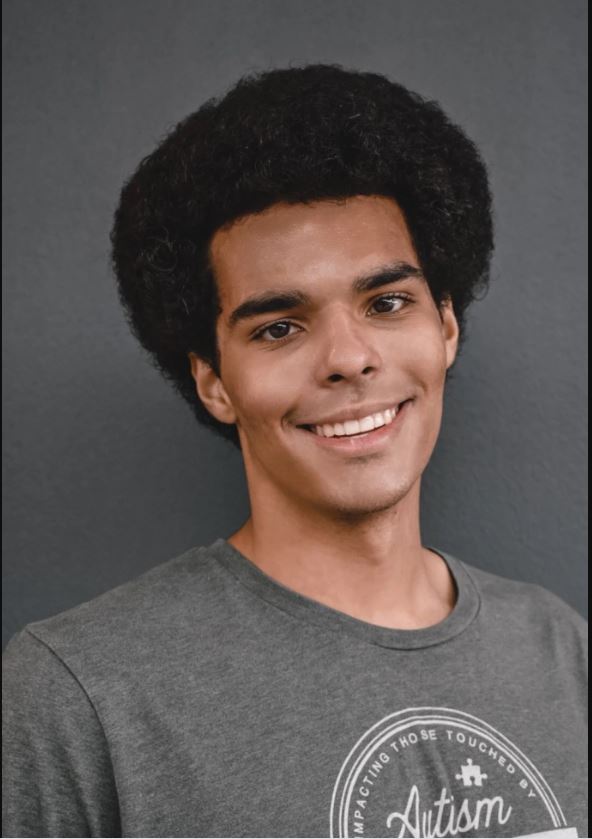WSU alum defies disability myths: 100% chance of success
Three speakers spoke about how to support students with autism and ADHD
WSU 2022 alumni in broadcast news and production Gillis Williams said when he was diagnosed with autism at five years old.
April 19, 2023
Three speakers educated the public about the strengths and struggles of living with autism and ADHD. The symposium took place from 12–3 p.m. on April 12 in Butch’s Den with a theme of “exploring neurodiversity.”
WSU 2022 alumni in broadcast news and production Gillis Williams said when he was diagnosed with autism at five years old, his parents read research that he would have a 0% chance of success.
“That’s what research actually said. My parents read almost 20 years ago an article that autistic individuals had a 0–10% chance of long-term success. And they found that baffling,” Williams said. “They’re like 0%? That’s it? ‘I believe they have a 100% chance of success,’ as quote my dad.”
In grade school, he said he would show disability traits like stimming, hand flapping and having loud outbursts due to his autism. When he tried to hang out with his peers, he would be excluded. Starting in fourth grade, he finally found some friends who accepted his autism, he said.
In high school, Williams said he worked in student radio production, eventually running his own show for two years with a co-host who also had autism. In his senior year, he was one of seven nominees out of thousands of students for Student of the Year Although he didn’t win, he said the nomination showed he was defying the odds and had more than a “0%” chance of success.
When Williams came to WSU in 2020, he said he started to use TikTok to connect with his WSU peers. He eventually saw TikTok videos educating people on autism and decided to create autism awareness TikToks himself. Today, his account has 155,000 followers and 11 million likes.
“I consider myself an influencer and an inspirer. I inspire people. I go around and speak to you guys. That’s more powerful than just the word fame,” Williams said.
Today, he said he is living in Eugene, Oregon and plans to move to the greater Seattle area within two years in order to educate people about autism full-time.
Leslie Gwartney, associate director of the Ravens scholar program at University of Idaho, a supported-transition program for students on the autism spectrum, said there are a lot of pervasive myths about autism.
“One stereotype is that individuals on the spectrum cannot empathize. They cannot relate to what it is like to be another human being,” Gwartney said. “So the counter to that is, actually, individuals on the spectrum can be hyper-empathetic. Some of them are just like neurotypical people. Empathy isn’t a trait or a lack of a trait because of autism. Now, the way that it is presented, the way that it’s communicated, might look a little different for an individual on the spectrum, but it is not a lack of empathy.”
Other myths include that autism is caused by poor parenting, that autistic individuals always want to be alone and that vaccines cause autism, she said. Most of the time, individuals with autism want to connect with others but have a lack of opportunity to do so and a lack of understanding of social skills.
Tammy Barry, vice provost for graduate and professional education who formerly was a psychology researcher at WSU, said there are no definitive biological tests for almost every psychological disorder, including autism and ADHD. Although research shows brain differences in neurodivergent people, these tests are too expensive to do practically. Instead, people are diagnosed by their behaviors.
ADHD symptoms include hyperactivity, difficulty focusing, being disorganized, losing and forgetting things and procrastination, Barry said. ADHD requires a professional diagnosis, just because someone shows symptoms does not mean they have the disorder.
There are three subtypes of ADHD: inattentive, hyperactive/impulsive and combined, she said. Combined ADHD is the most common. ADHD is underdiagnosed in girls, which may be because they are more likely to have the inattentive type of ADHD so they do not show disruptive behaviors.
Although neurodivergence can be a struggle, every disorder also comes with unique strengths, Barry said. She researched ADHD for almost three decades and has seen so much change happening in being able to treat the disorder and receive social accommodations for it.
“We need to recognize that people sometimes need different ways of being educated. And so I’m really passionate about advancing that,” she said. “Individually, it’s just fun to work with people. I love helping people. It’s great to be in the room and making a difference.”









Emily Berry • Apr 20, 2023 at 11:33 pm
Great article! This is definitely a topic that needs more awareness brought to it. I have a couple of friends who are autistic and it saddens me when people don’t give them a chance because they don’t realize that they don’t always pick up on “normal” social cues. If people gave them the benefit of the doubt, they’d see how kind-hearted, smart, and amazing these people are.